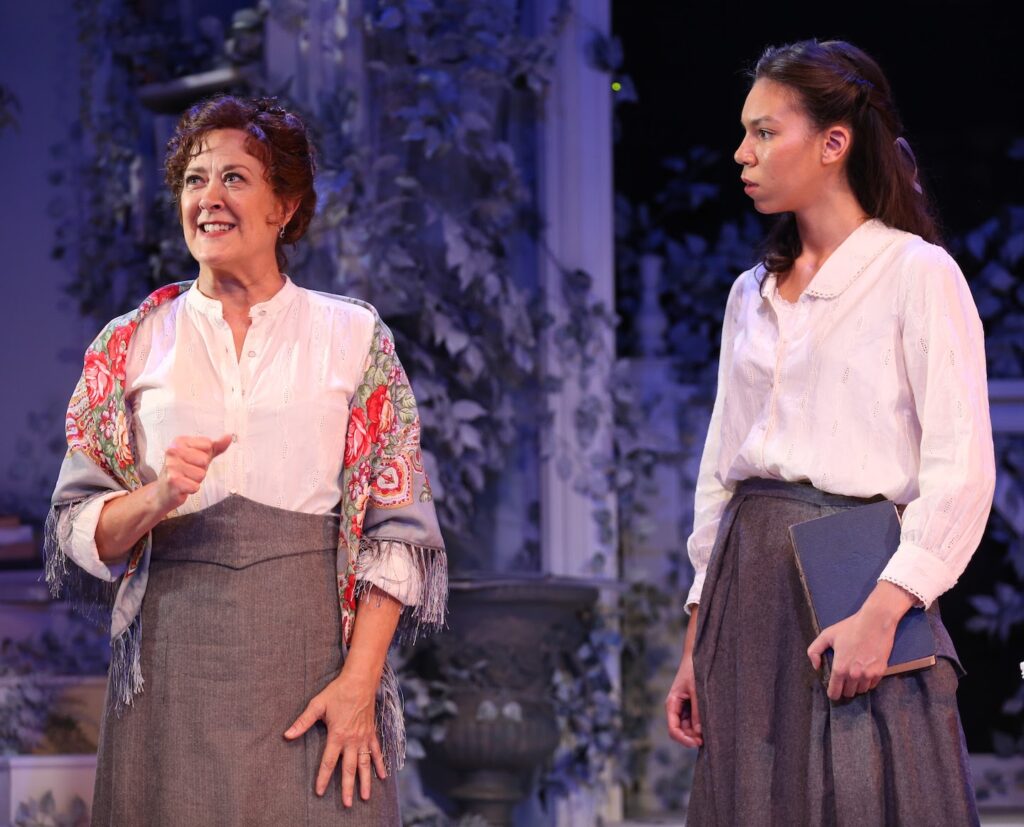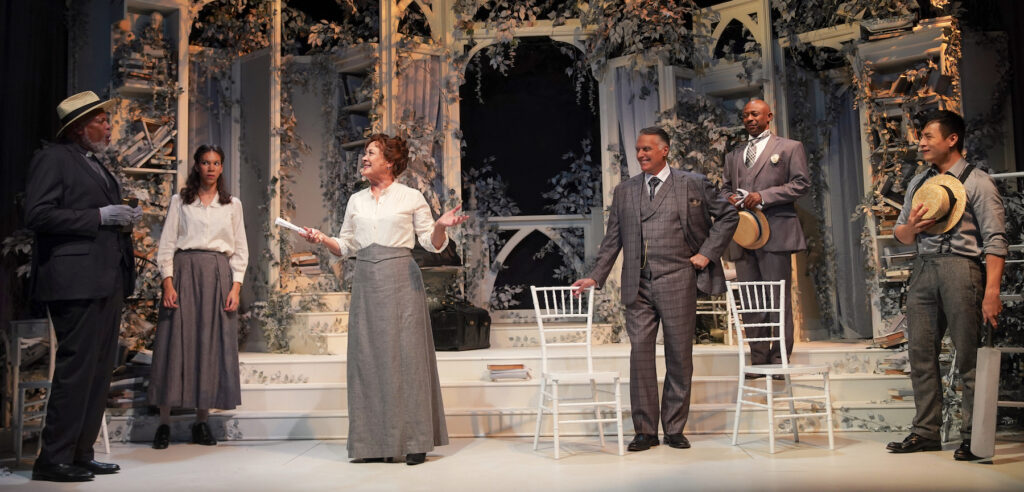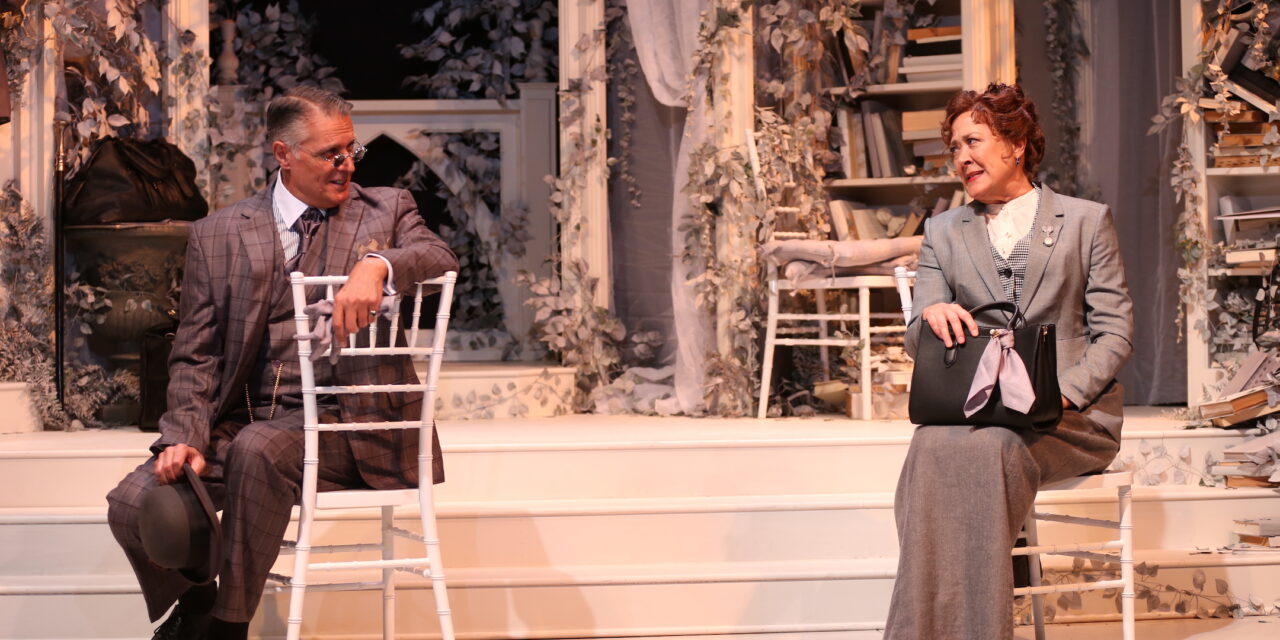By Bart Greenberg . . .
David Staller’s passion for the works of George Bernard Shaw is apparent in every production the Gingold Theatrical Group offers. Each of the plays is thoroughly explored before the audience gets its first glimpse of the presentation. In the case of their newest program, the often revived Mrs. Warren’s Profession, the producer/director compared four published versions of the play overseen by the playwright, as well as his handwritten work copy and notes for a proposed film that was never made. From all this input, he has created a swift one hour and forty minutes version, uninterrupted by intermission, which emphasizes both the philosophy behind the story, and its finely detailed characters who shift from cliches to complicated humans.
Although the title character is actually not the protagonist of the story, it is a role that has attracted such diverse leading ladies as Ruth Gordon, Cherry Jones, Joan Plowright and Coral Browne. Now included in this starry company is the actress/dancer/singer Karen Ziemba, who has spent a career shifting back and forth between musicals and dramas, contemporary and classic works. Kitty Warren, the defiantly proud brothel keeper and wildly successful businesswoman, who only stumbles when it comes to trying to secure a respectable future for her daughter of uncertain parentage, is another triumph for the multi-talented star. Her entrances send electricity through the theater and her shifting moods are so well defined as to be shining facets of the same character. It’s interesting to hear her accent slip back and forth between her lower working class beginnings (with shades of Angela Lansbury’s Mrs. Lovett slipping through at times) and her assumed classier pose. There are many levels to her creation.

The real protagonist of the tale is her daughter Vivie, a young woman teetering between child and adult. Nicole King catches both aspects of our heroine, her innocence edged with cynicism and her jaded adulthood layered with a self-sense of tragedy. At times, there were hints of the prized Shavian interpreter of the ‘30s Wendy Hiller coming through her awakening of the realities of the world that many of the playwright’s “modern women” undergo.
And herein lies a problem with the production and the play itself. Shaw sought to shock his audiences with his portrayal of a new type of heroine. Unfortunately, the world has caught up with and bypassed some of these women and perhaps Vivie most of all. Her final scenes present her as bitter, cold and a bit of a prude as she rejects her mother and, somewhat hypocritically, the monies she has unquestionably lived off and provided her a very comfortable existence and an excellent education. With no suggestion that any of the working girls under Mrs. Warren’s employ have suffered from their association (one even “married an ambassador!”), Vivie’s reaction seems a bit excessive.
Not that the men circling her serve as any sort of temptation for her to reject her chosen isolation. David Lee Huynh brings a rambunctious energy to the ardent and calculating young swain, Frank Gardner, who somewhat overdoes the physicality of the role. Any charm to the performance quickly dissipates as his gold-digging tendencies become blatant. Even before certain revelations are exposed, he never seems a worthy match for the intelligent and independent Vivie.


Surprisingly, under the subtle effects of Robert Cuccioli’s performance, Sir George Crofts, the jaded and corrupted business partner of Mrs. Warren, seems the more viable option. He may be scheming and amoral, but he has immense charm and a respect for Vive’s intelligence and strength. Cuccioli not only brings his physical presence and charisma to the role, but an ease in the contradictory nature of the character that often makes him the most vivid personality on stage.
In support, Raphael Nash Thompson was pleasant company as the least complicated character, the Reverend Samuel Gardner. Perhaps the most surprising creation was offered up by Alvin Keith as Praed, another associate of Kitty’s, though his exact contributions to the business remain a mystery. Keith chose to make little secret of his character’s sexual orientation, taking the scattered clues in the script – especially his desire to go off on a European art tour. Seemingly, Shaw created the first gay best friend to the heroine in literature.
The design team (scenic design by Brian Prather; costume design by Asa Benally; lighting design Jamie Roderick) subtly capture director Staller’s vision of beginning the story amid a profusion of Victorian decoration and slowly simplifying it in both light and color until we are left in a grey world (except for Mrs. Warren who adds a splash of color with her burgundy vest reflecting her refusal to surrender to the moral certainty of her daughter). The production provides the audience with a thought provoking journey, but fails to offer a satisfactory resolution, falling somewhere between hope and despair.
Photos: Carol Rosegg
Mrs. Warren’s Profession – Theater Row, 410 West 42 Street, NYC, thru November 20th. www.gingoldgroup.org





















